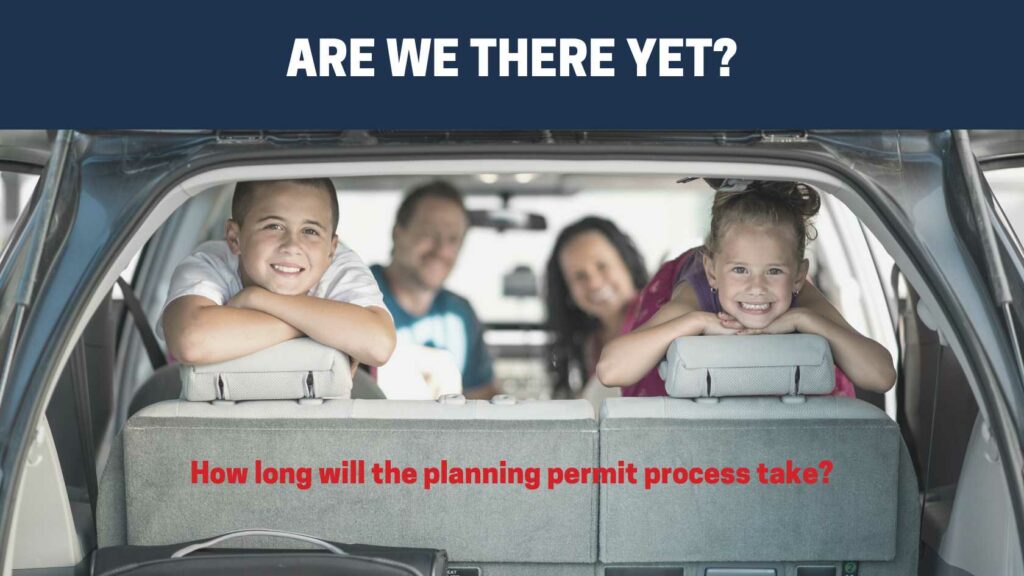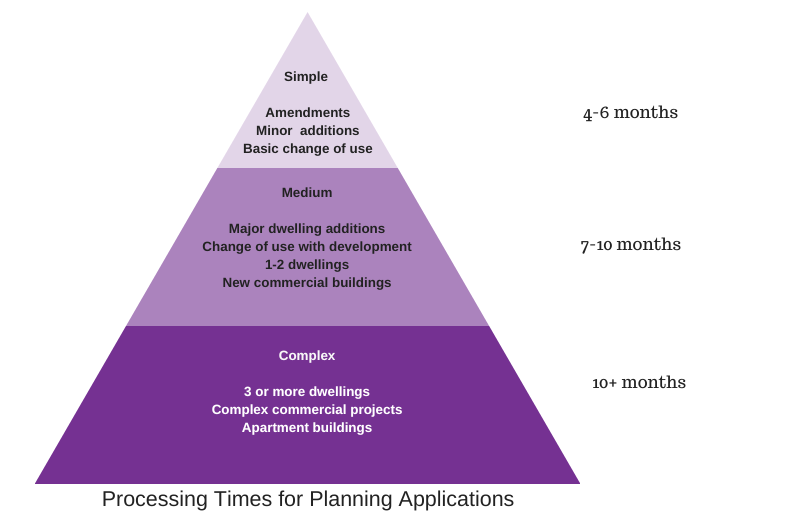30 Mar How Long Does It Take To Get A Planning Permit?

“How long will the planning permit process take?”
This is one of the first questions people ask me, and one of the most difficult to answer.
The short answer is quite a long time, and longer than many people realise!
The reason why it is a difficult question to answer is because the planning process is complex. It involves many different people and steps which can all hold up the process for an undefined period of time.
Now, the town planning process is more than just lodging the planning application and receiving the final decision from the council, It is the time in the middle where most of the time is spent. This is the part that we track and monitor for our clients and where we work to reduce the time frame as much as possible.
Much of the time spent within planning is time spent waiting. We have to wait for the application to be processed, wait for advertising to be prepared, wait for referral authorities to respond back to Council, you can see the pattern! I have written more about the planning application process here, walking you through the main steps involved to give you a better idea of the overall process.
Guide To Planning Processing Times
However, none of this gives you any definitive information so below I have laid out a guide to how long the planning permit process can take for different types of applications. Of course, each application is unique so some may take more or less time than this, but it does give you an idea of the times involved.

Of course there are exceptions to this, but no-one ever complains if they receive a decision faster so I tend to put more emphasis on the longer time frames than the shorter ones!
Isn’t There A Time Limit For Council’s To Make A Planning Permit Decision?
Some people might have heard that there is a time limit and Councils’ must make a decision within 60 days. There is a time limit specified within the Planning and Environment Act for decisions to be made. However, the 60 day rule is simply that an applicant can appeal to the Victorian Civil and Administrative Tribunal (VCAT) after 60 statutory days. This type of appeal is known as a failure to determine. You can read more information about failure to determine applications within the article on Going to VCAT.
What Are Statutory Days?
The term statutory days is used because it is not a simple count of all time that has passed since an application is lodged, but a defined subset of that time. Some periods of an application are excluded, such as the time taken for further information requests. I have written up a guide on calculating how many statutory days have passed for your application to assist with this.
The reality is that many planning applications are not decided within 60 statutory days. Generally it is the smaller and less complex applications such as minor works or amendments to existing planning permits that are decided within this time. It is also important to know that if the application is amended during the process then the clock resets back to zero. It doesn’t matter if you are amending the plans because you want to make a change or because you are responding to a concern raised by the Council, any amendments to the plans will restart the calculation of elapsed days to a decision.
Other Factors Affecting Planning Permit Time Frames
To add further complexity to working out how long the planning application process will take, it is also dependent on how efficiently a Council is working at the time. We tend to see trends where there are staffing issues in the Council which have a flow on effect of slowing down processing times. Similarly, at times a Council may put considerable effort in responding to and reducing bottle necks in the system and therefore reduce processing times. Some Councils also publish information advising customers of their processing times in an effort to be transparent.
Lastly, the other factor to remember when considering the time frame of your project, is that receiving a planning permit is typically not the end of town planning. A planning permit is usually issued with conditional changes to the plans. These changes are required before the planning permit can be acted upon. This part of the process is basically council saying: ‘yes we will approve… But you need to do this first’. This means that after a permit is issued the plans need to be amended and resubmitted back to Council for final endorsement. The endorsement process varies, but typically takes 4-6 weeks.
So What Can Be Done?
We can’t change a council’s efficiency or the number of steps in the planning permit process (unfortunately!). Instead, our focus is on working hard to trim the time spent going back and forth to Council by providing all necessary information as quickly as possible and keep the application process moving.
Firstly we focus on providing a clear and easy to understand Planning Report and submitting as much information as possible with the lodgement. We then maintain a schedule of follow ups on the Council to make sure your project is on its way and that our clients are kept updated. Lastly, we process all requests that are sent to us as quickly as we can. We pass on updates or requests for information from the Council without delay, nothing is more frustrating than finding out something has been pending for weeks without the responsible person doing anything! We provide you with a reasonable timeline that we will complete information by and then stick to that time frame. We focus on managing our workloads and proactively following up Council to reduce bottlenecks and keep things flowing, keeping the application on track and moving through the process as quickly as it can. In this way, we work hard to improve your planning permit processing time.
Have an application that is off-track and delayed? Or wanting to find out more about how we can assist you with your planning project? Call or email today and we can start the conversation.

